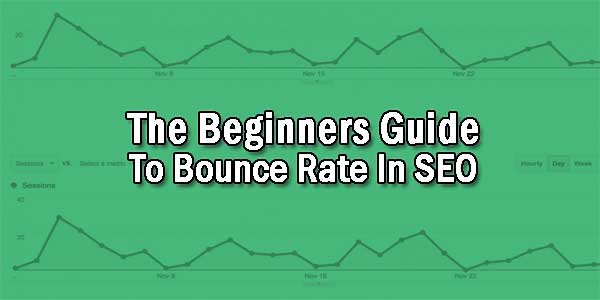
Bounce rate (a blog or web site). It’s one of those terms that you as a blogger beaten regularly driving to the ears. But what is it exactly, and it is as important as some would have us believe?
Table of Contents
What Is The Bounce Rate?
In short it is the percentage of visitors who land on your blog (via clicking on a search result in Google, clicking through from a link via social media or typing a URL in the browser) while no other article or page click. It refers that your visitor land on your blog and after scrolling through your content comes to an end that you are not offering what ‘he is looking for’ and is gone immediately.
We are talking about a high bounce rate. Do you have a large percentage of visitors that leave your blog without tapping a blog or page? If you’re one of the victims of high bounce rate then there is a possibility that your blog is not competent enough to make your visitors satisfy from the information you shared. Always try to share something that your readers want to read and find. This tactic will surely decrease your sites bounce rate.
Why Is Bounce Rate Important For You?
Thanks to Google. Bounce rate is a fairly important criterion for the value – to assess the importance of a blog, website or page. This is the logic that lies behind it:
An article that is getting much click, but most of (its) searchers click away immediately again, this is a clear sign to Google that there is “something wrong” with that page/site or is not sharing valuable content to the visitors. This condition clearly refers to the low quality of article/site. The result? The article is placed lower or wipe out from the search results. Take of look of this guide to find out content ideas that are really worth to share.
The reverse is also possible: If Google comes across a site that is not only very often selected, but where there is also a vengeance to click through to other pages is a sign of “quality. Google argues: “Many people stay here like to hang out – which would not happen if the content would be worthless – so apparently some people are here.” The result? The article is placed higher in the search results.
In general, the lower the bounce rates … the better. And conversely, the higher the bounce rate … the problematic.
How To Measure Bounce Rate?
There are various tools, programs and plugins exists that can do this job for you. Personally, I use Google Analytics as it is more reliable product to trust.
What Is An Acceptable Bounce Rate For A Blog?
And here we go on thin ice so because once again figures say something, but not everything. The bounce rate of such blog is indeed fairly easy to influence.
According to Anders analytics:
“Average bounce rate for most sites typically fall in 40% – 60% range. If your site bounce rate is below 40% you are doing well and if it’s above 60% then you definitely need to find out why.”
High Bounce Rate? Do Not Panic!
Because every blog is different and as I said earlier, do not panic because it is a thing that is easy to manipulate. It could also just be that your article is so furnished or you have put all the detail in just one article instead of breaking into different pieces of articles. Admittedly, I’m just out here of the most ideal scenario.
Blogs are usually sites with a fairly high bounce rate. This usually happens when you have many loyal followers. This is not illogical: Once your new blog post goes online your followers’ visit your blog to read that post. They quickly read all the information that is shared with them but since they are very well aware of the other post on your blog and they are less likely to click through to other posts and pages.
Moreover, readers who land on your blog through search engines are also not the most grateful audience (especially in 2015). They would like an answer to a pressing question (and a little fast or fall clap)! Once they successfully find their answers on single post they immediately depart from your blog.
Conclusion:
A remarkably low bounce rate indeed does not always mean to good news. It could be possible that visitors has clicked / searched unnecessarily (on your blog) before one can finally start reading. The risk of early drop out.


 About the Author:
About the Author:












Though blogs usually have high bounce rates, you shouldn’t settle for that! One of the very good ways to reduce it is by using exit-intent technology. Yes, sounds like a promotion, however I have to admit that it really works! Since I work for the company MaxTraffic which is selling this solution, I’ve seen the fantastic results the statistics show regarding our clients. You can check out our product as well as try how it works, if feel like doing that (since it’s very important to trust the feeling inside)
Welcome here and thanks for liking our article and sharing your views. Stay with us to get more on this topic…
Hi Paula,
I highly appreciate your valuable comment. Thank you for taking time to comment.
-Mustafa
Yes you are right. Bounce rate is definitely a problem for me. It’s as high as 60%. Though some of my blogs have very less like <10%. So I think is the kind of traffic which affect all these measures. What do you think?
Welcome here and thanks for liking our article and sharing your views. Stay with us to get more on this topic…